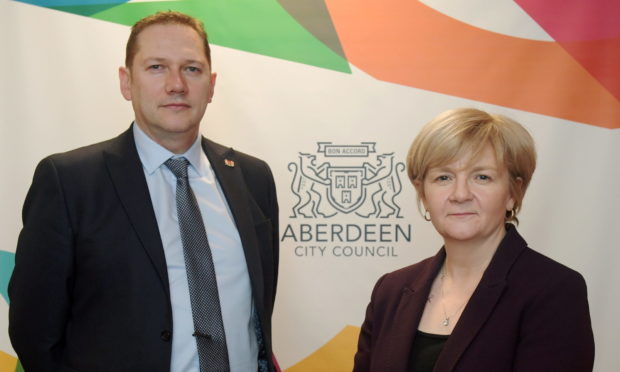Aberdeen council leaders have warned they will “inevitably” be forced to make tens of millions of pounds of cuts this year- and that council tax is also likely to rise.
Townhouse number-crunchers have been going over the latest figures from the Scottish budget which they say will mean local authorities across the country lose out and have to take on extra responsibilities.
Last year the ruling Conservative, Aberdeen Labour and independent administration passed a budget with more than £40 million in cuts and savings – slashing the likes of grass cutting, introducing a £30 brown bin tax and hiking council tax.
And yesterday leaders said the axe would fall hard again “across the board” with council tax and other fees likely to go up once more as they look to fill a £38 million black hole.
It has stressed that its policy of not directly sacking workers, and instead looking to make the savings through early retirement and voluntary redundancies, remains.
Last week the leader of neighbouring Aberdeenshire said he “couldn’t rule out” a council tax rise in the area.
Aberdeen council co-leader Jenny Laing said: “Once again we see the Scottish Government using smoke and mirrors to mask their ongoing assault on local government funding.
“Whilst they claim to be giving Aberdeen City Council more cash we now have confirmation from both our own officers and COSLA that our budget has actually been cut in real terms.
“This latest brutal budget cut will almost certainly hit front line services that many of our residents depend upon.
“It is clear for everyone to see that SNP austerity is still firmly being passed down by the Scottish Government to councils right across the north- east of Scotland.”
Fellow co-leader Douglas Lumsden added: “Aberdeen’s citizens will be the biggest losers following the decision taken by the Scottish Government to cut in real terms the city council’s budget.
“The SNP have once again failed to deliver an adequate amount of grant that allows the Council to fulfil its obligations to the city and its citizens.
“COSLA are rightly demanding further talks with the Scottish Government in order to secure more money for vital front-line services.
“It is disappointing that the Scottish Government have reduced our revenue grant but they have also slashed our capital grant which means we are less able to invest in new schools for our children our better social facilities for our elderly.”
A Scottish Government spokeswoman said: “This budget provides a fair settlement for our partners in local government and supports vital public services across Scotland.
“Taken together with the flexibility to increase council tax, this local government settlement gives councils an increase of revenue spending of up to 4.3% in real terms to deliver local services.
“Despite constraints through a decade of UK austerity and the uncertainty caused by Brexit, we are investing in the fairer and more equal society all of us would like to see.”
THE BACKGROUND
In 2017, councillors approved a massive restructuring programme aiming to save the authority £125 million over the next five years.
As part of the cuts, chief executive Angela Scott pleaded with members to back a new “target operating model” – warning budgets could be “salami sliced” if the shake-up was not approved.
Those changes, which will save more than £280,000 a year, will move the council to a more corporate model, with the directorates replaced by directors of “customer”, “commissioning”, “operations” and “resource management”.
But the opposition SNP and Liberal Democrat groups rounded on the plan, saying it could lead to a “democratic deficit” with powers stripped away from elected members and handed to civil servants.
After a series of questions on whether there would be staff cuts, she said: “We are committed to a fiscally sustainable council now and in the future.
“Bluntly, we need to have a reduced workforce and we are shrinking the management side of that as well.”
The council has long had a policy of not sacking workers, but has been carrying out a large-scale voluntary redundancy programme, which has so far helped it shed 170 staff.
The ruling administration has long blamed decreasing Scottish Government grants for the shortfalls, but have ruled out making any direct staff cuts to save cash.
This has been welcomed by unions who have warned that any compulsory redundancies would risk the level of services delivered by the council.
Opposition members have, however, questioned the spending priorities of the administration – pointing to many projects that have run over time and budget.
